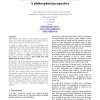Free Online Productivity Tools
i2Speak
i2Symbol
i2OCR
iTex2Img
iWeb2Print
iWeb2Shot
i2Type
iPdf2Split
iPdf2Merge
i2Bopomofo
i2Arabic
i2Style
i2Image
i2PDF
iLatex2Rtf
Sci2ools
MSV
2004
2004
Correctness Criteria for Models' Validation- A Philosophical Perspective
Valid models are central to the existence of Computer science as in most other disciplines, but at what point can one say that a model is valid and hence correct? is often taken to be an abstraction and simplification of reality (of the system being modelled) but reality (the nature of measured data, environmental and ctors) in itself, has a nature of abstract complexity, hence a `correct' model could at best be judged as one which is `closest' in representation to the real system, but the question is just exactly how close should `closest' be to be correct? In this paper, we shall examine some common and general correctness criteria for models validation and seek to relate them to various philosophical perspectives to see how much information the basis of acceptance of such valid models could give (content and truth). We shall also strongly explore and consider the salient philosophical angle, which presents validation only as a method to improve the level of confidenc...
General Correctness Criteria | MSV 2004 | MSV 2007 | Valid Models | Various Philosophical Perspectives |
| Added | 31 Oct 2010 |
| Updated | 31 Oct 2010 |
| Type | Conference |
| Year | 2004 |
| Where | MSV |
| Authors | Ijeoma Sandra Irobi, Johan Andersson, Anders Wall |
Comments (0)

